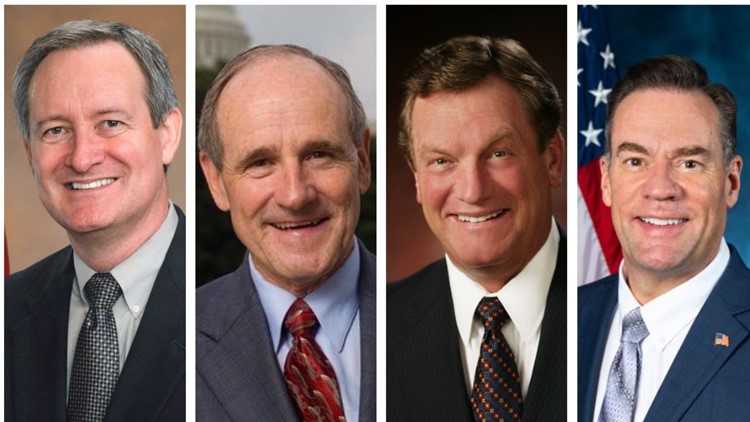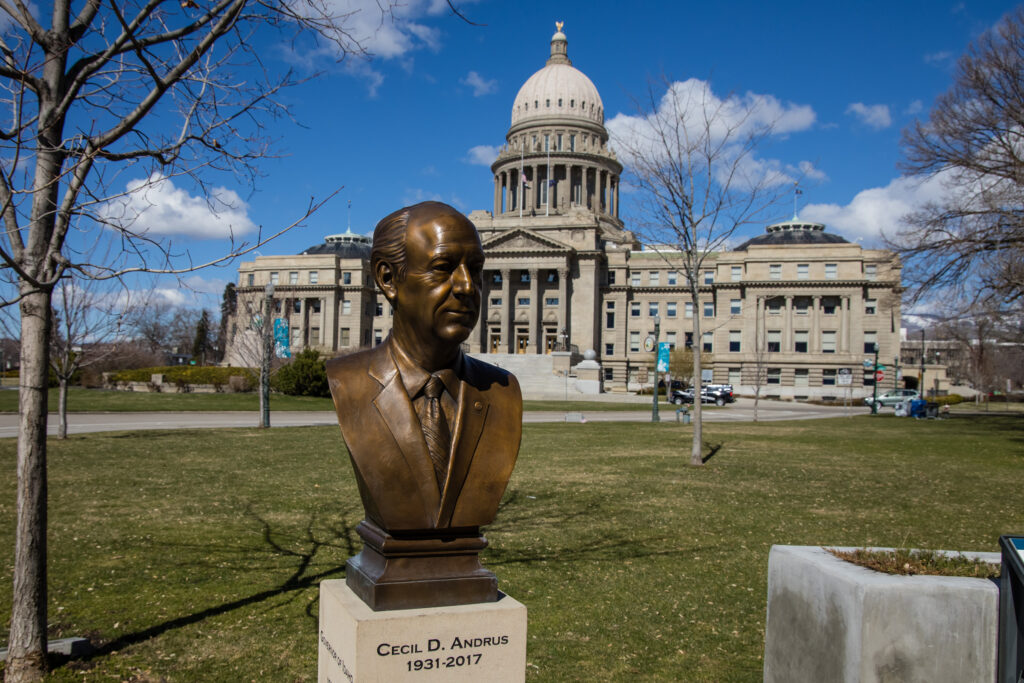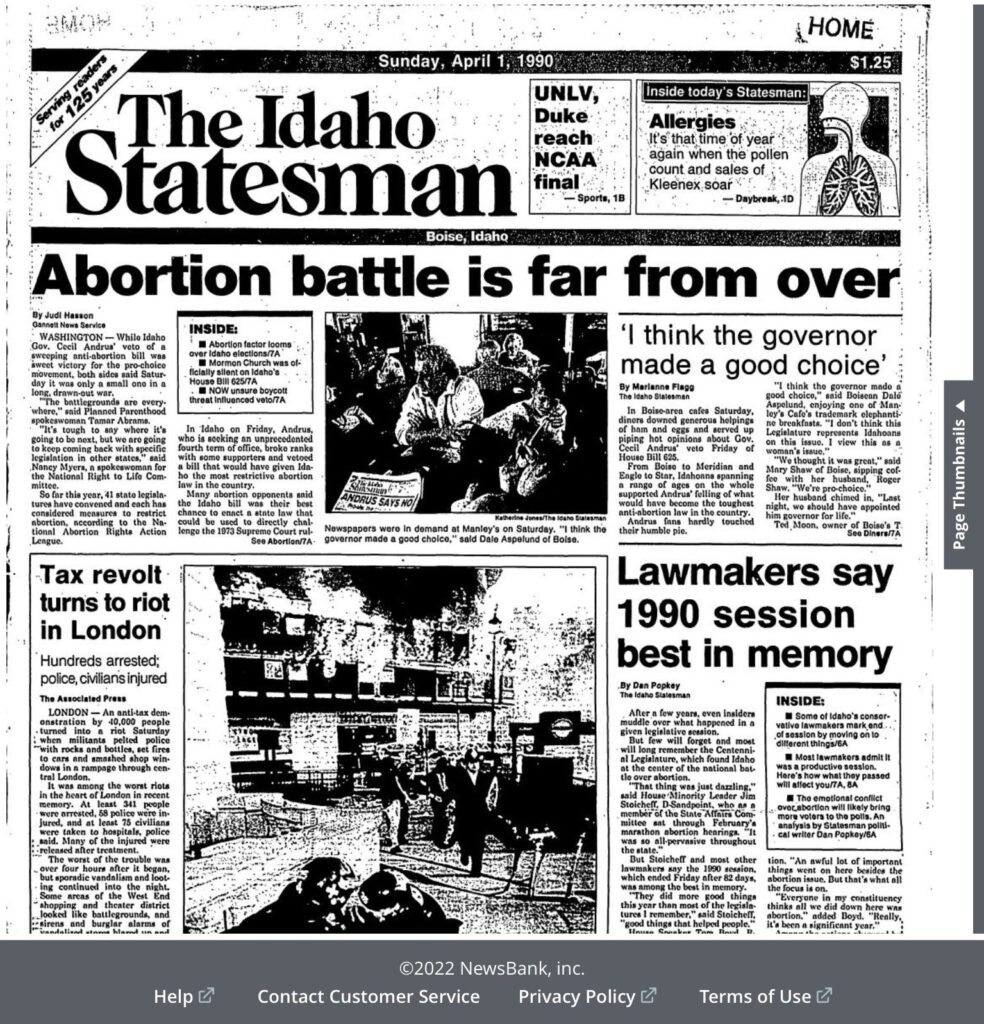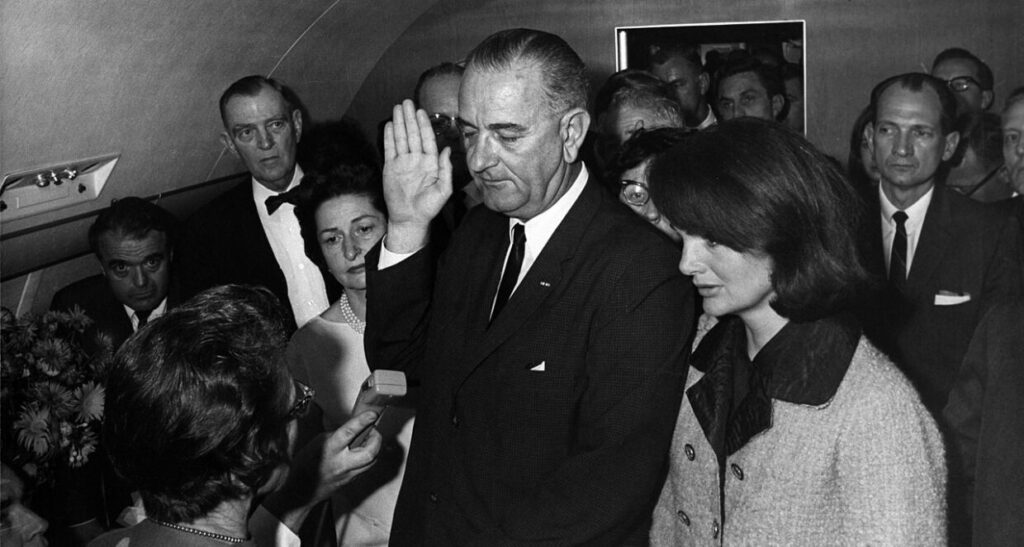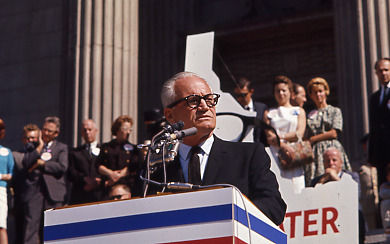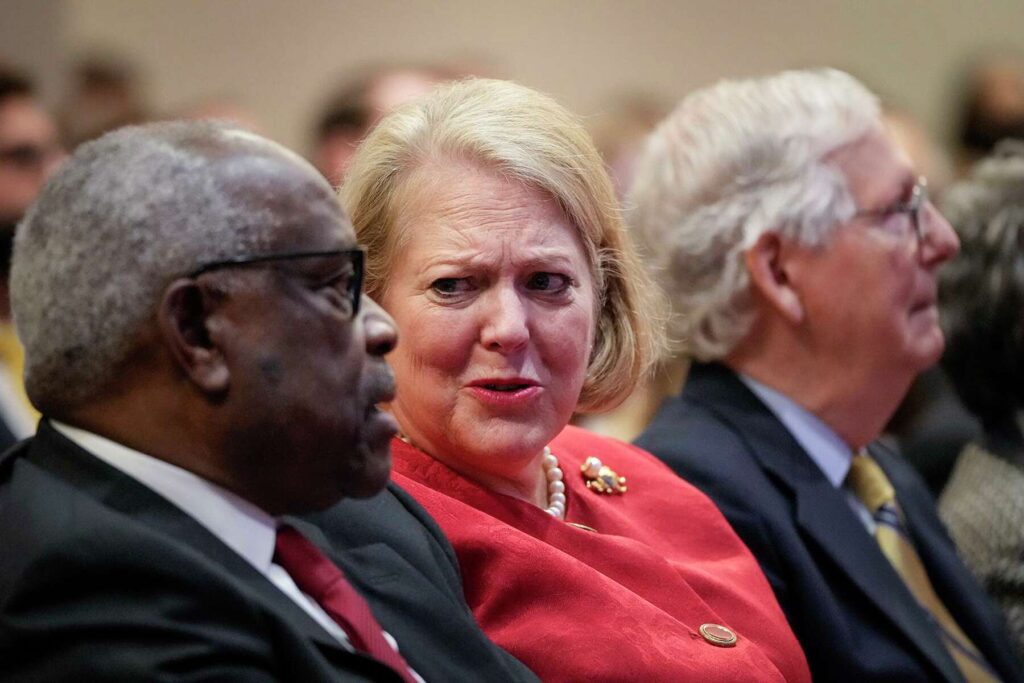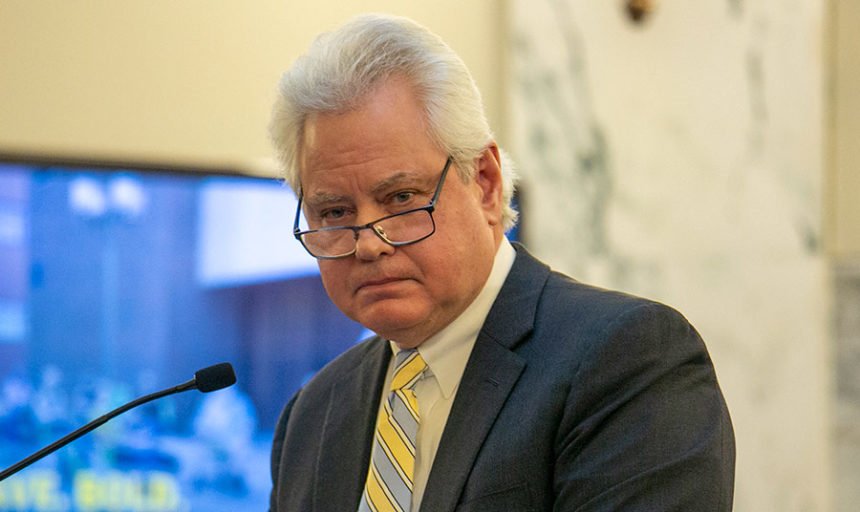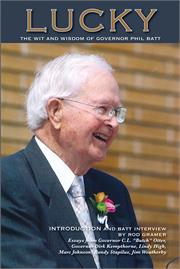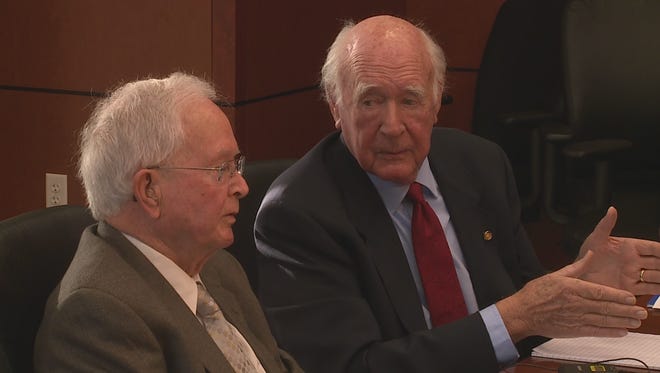Years before it became an engine of the Idaho economy, and a leading American manufacturer of what Micron Technologies describes as the “world’s most advanced memory and storage technologies,” the Boise-headquartered company was a struggling start up.
Founded by twin brothers Joe and Ward Parkinson in the basement of a dental office in the late 1970s, Micron became a home-grown Idaho success story, not unlike Jack Simplot’s sprawling agri-business empire – Simplot was an early Micron investor – or Joe Albertson’s big grocery store company.

Like many successful startups, Micron often depended on support from politicians to go from the ideas hatched in that basement to a company today with facilities in 17 locations around the world and 40,000 employees. Micron recently received some of that governmental help, the so-called CHIPS Act, a bipartisan initiative that invests billions in “semiconductor research, development, manufacturing, and workforce development.” Days after Joe Biden signed the legislation, and not coincidentally, Micron announced a $40 billion expansion, including a $15 billion commitment to new manufacturing facilities and many new jobs in Idaho.
Here is the curious thing, indeed the mind-boggling thing: Idaho’s all Republican congressional delegation opposed the CHIPS Act. So did the Chinese government. Square that circle if you can.
As Reuters reported: “The Chinese Embassy in Washington said China ‘firmly opposed,’” the legislation “calling it reminiscent of a ‘Cold War mentality.’” In other words, China wants a weak American manufacturing sector, particularly when it comes to technology.
Biden pointed out that the US needs computer chips for major weapons systems like the Javelin missile. “It’s no wonder the Chinese Communist Party actively lobbied U.S. business against this bill,” Biden said.
Here’s another curious thing: the all Republican Idaho delegation voted against the legislation that paved the way for the hometown expansion of a major Idaho business, and then celebrated the company’s decision to expand. It is the most shamelessly hypocritical act of political jujitsu that I can remember in more than 40 years of following Idaho politics.
The shameless pandering was widely pointed out by among others the editorial board of the Idaho Statesman. “There’s something worse than hypocrisy going on here … There was no clearer beneficiary from the CHIPS Act than Idaho. Roughly half of Idaho’s total manufacturing exports are computer chips, according to the Office of the U.S. Trade Representative. Indeed, chips are on par with, though a bit behind, agricultural products. Idaho exports more value in microchips than in potatoes.”
The newspaper concluded Senators Mike Crapo and Jim Risch and Congressmen Russ Fulcher – Fulcher was an early Micron employee – and Mike Simpson ignored a basic duty of their office to support a policy that directly benefits Idaho and the country, while attempting to keep this vital manufacturing here at home.
The no votes were votes against jobs, against international competitiveness, against common sense. Apparently, the Idaho delegation was more focused on opposing a policy that originated in a Democratic administration, even though many House and Senate Republicans ignored the pleas of party leaders to deny Biden a legislative victory.
The most shameless pander of all came from Risch, who had the gall to say on his social media feed that “Idaho & Micron have been partners since Day One of the company’s founding. This announcement of a new fab coming to Boise deepens that partnership.”
In Risch’s case that statement is particularly untrue. I know. I was there.
In 1988 when Risch was president of the state senate, then Democratic governor Cecil Andrus championed increases in educational support, including the first concerted and ultimately successful effort to bring higher education science and technology courses to the Boise Valley. Risch was a no then, too.
In 1988, Micron was in its first big expansion phase with plans to create a new manufacturing facility and 1,000 new jobs, but the company worried that Idaho – and legislators like Risch – wouldn’t support its aspirations for better educational offerings close to its Boise headquarters. Micron seriously considered siting its new facility in Oregon.
But Andrus intervened, along with then Boise State University president John Keiser, and quietly helped engineer a land swap and funding from the university foundation to build the necessary educational infrastructure. Risch, not surprisingly, defaulted to his kneejerk position which was to oppose anything Andrus tried to accomplish. He complained that Andrus negotiated the deal without legislative input. On that Risch was correct.
The governor was afraid that age-old rivalries between Boise State and the University of Idaho over control of engineering offerings would kill the deal, and he worried that land values would skyrocket with speculation about a new university building. And that nearly happened, as Risch complained that he’d “never seen a situation like this,” meaning apparently, he’d never seen a governor solve both an educational problem and secure an economic development win by leaving naysaying Republicans on the sidelines.
So, when Risch says Micron and Idaho have been partners since day one, he’s counting on the fact that none of his constituents will remember that 34 years ago – Risch really is a career politician – he actively opposed the educational investments that jump started Micron’s rise to become one of the biggest international players in semiconductor technology.
As far as I can tell no one in the Idaho business community, including Micron, has called out Risch and the rest of the Idaho delegation for opposing the CHIPS Act, and that is really a shame because failing to hold the shameless responsible for turning their backs on a major employer, not to mention ignoring a national security matter, will merely encourage more such behavior in the future.

It wasn’t always so. In 1988, then-Micron CEO Joe Parkinson, hardly a liberal, took Risch on, saying the company was dismayed with his legislative leadership. “We thought we were talking to a senator who represented us,” Parkinson said in an interview where he announced Micron would oppose Risch’s re-election due to his lack of support for education.
Risch responded that he was just doing what his “constituents want,” which was to hold the line on educational spending “and not raise taxes.” The senator’s position was as shortsighted then as it is now. And, just to complete the history lesson, Risch lost re-election in 1988 by more than 10,000 votes.
After that election, which Andrus described as “a referendum on education,” Risch told reporters he was done with politics. “I never intended to make politics a career,” he said.
It wasn’t the last time he misled his constituents.
—–0—–
Additional Reading:
A few other stories from around the Internet …
The Bizarre Story of Piggly Wiggly, the First Self-Service Grocery Store
Another economic origin story.
“Before Piggly Wiggly, groceries were sold at stores where a clerk would assemble your order for you, weighing out dry goods from large barrels. Even chain stores used clerks.”
The Pig, as my mom called the store, changed the game. Link here.
Looking for the Good War: American Amnesia and the Violent Pursuit of Happiness
A review of a book by Elizabeth D. Samet who teaches at the U.S. Military Academy at West Point.
“The great thing about the American empire,” observes historian Niall Ferguson—a fan of that empire—“is that so many Americans disbelieve in its existence.” Samet argues that a major reason for this disbelief is the collective misrepresentation of America’s triumph in the Second World War. Tom Brokaw’s The Greatest Generation, Steven E. Ambrose’s Band of Brothers, and Stephen Spielberg’s Saving Private Ryan are only some of the better known evangelical texts of American exceptionalism. A sea of popular culture—books, movies, newspapers, radio and TV shows, comics, and social media campaigns—has transformed the war into what Samet calls an enduring “testament to the redemptive capacity of American violence.” This, she writes, “leads us repeatedly to imagine that the use of force can accomplish miraculous political ends even when we have examples of Vietnam, Iraq, and Afghanistan to tell us otherwise.”
THE QUEEN OF THE WORLD
The Queen is dead.

“On Princess Elizabeth’s 21st birthday, she delivered a radio broadcast that would define her life. Addressing all ‘the peoples of the British Commonwealth and Empire,’ and specifically ‘the youth of the British family of nations,’ she asked for their permission to speak as their representative. Delivered from Cape Town, South Africa, this was not a message to England, or Britain, or even the United Kingdom, but to the already fading empire.
“The message was designed to inspire, but also to begin a transition. The princess declared that just as England had saved Europe from Napoleonic domination in the 19th century, the British empire had saved the world from Hitler in the 20th. The task now before the empire was just as pressing, she said: It needed to save itself.”
I’ll be away from my regular Friday column for a while, but may be posting here and there during some down time. I’ll be in touch and thanks for reading. All the best.






